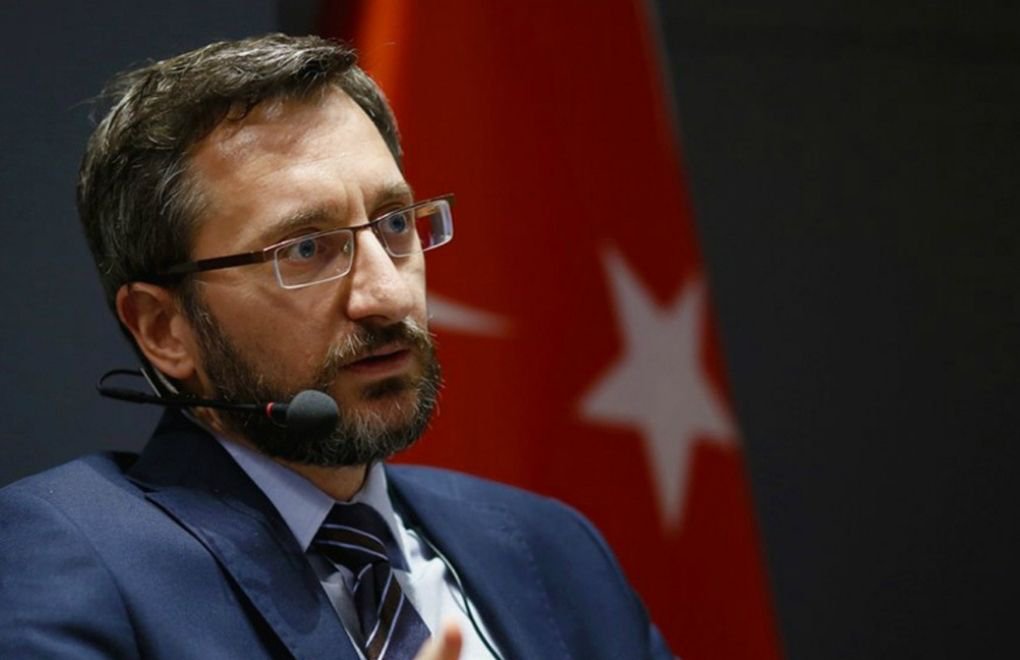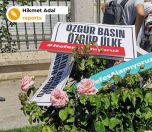* Photo: Anadolu Agency (AA)
Click to read the article in Turkish
Presidency's Communications Director Fahrettin Altun has talked about the news regarding some media outlets funded by foreign countries.
Altun has said that "they are closely following the claims that some media outlets in Türkiye are funded by a foundation based in the US."
"Everyone should rest assured that our democracy will not be a sitting target under the pretext of press freedom or for any other reason. We will not allow fifth column activities under new guises," Altun has said.
Altun has noted that "the free press is the backbone of democracy," reminding "that the Turkish Constitution protects freedom of information."
Altun has made the following statement about the issue:
'Regulations required for them'
"In an environment in which some foreign leaders openly express their intentions and efforts to design Turkish politics, we cannot interpret any foreign state or institution providing various funds to the media sector independently of such interests and goals.
"Everyone should rest assured that our democracy will not be a sitting target under the pretext of press freedom or for any other reason. We will not allow fifth column activities under new guises.
"Our country clearly needs a regulation on media outlets that operate in our country with the funds provided by foreign states or organizations.
"An example of this is available in the US. For example, media outlets funded by foreign countries are required to provide detailed information on their activities to the US authorities every six months.
"There are also various media outlets in Turkey that are directly funded by foreign states and operate with a similar status. We will complete the regulations required for them as soon as possible to maintain public order and protect our people's right to accurate information."
What happened?
In a news report published by Odatv on July 21, it was said, "Critical institutions in Turkey have turned out to be funded by hundreds of thousands of dollars from the US-based Chrest Foundation." In its news, Odatv pointed at some institutions, including Medyascope.org. Several journalists and readers have protested that Medyascope and other outlets are targeted.
Odatv has reported on these protests and criticisms as well, saying, "Odatv wrote about the funded media and sparked reactions... Some press members who have not expressed solidarity for Odatv, which has been closed for two years, have shown reactions after Odatv wrote about the ones who are funded by the US institution." This news has also been met with criticisms and protests by journalists.
Developing projects, receiving funds* A project can be defined as the work to be undertaken by organizations such as associations/ foundations and the institutions working in the fields of gender, children, education, violence, media, etc. The budget of this work is called "fund." * In some countries, citizens apply for "public funds" for such works, they receive their support from the state and realize their projects. In some countries, it is not possible for every organization to access "public funds." You apply for global organizations, primarily to the European Union (EU), with your projects. * If the application covering the activities, the projected outputs and expenditures is accepted, an agreement is signed. The payment is made to the bank. For Instance, if you are a foundation, you fill out the Foreign Grant Notification Form and upload it to the Foundation Information Management System https://vbys2.vgm.gov.tr/login.aspx of the General Directorate of Foundations' Foundation Services Department, together with the bank receipt of the fund. As the information regarding your project is also included in the Form, it is now known from the very first step onward why the fund is sent. * At this stage, your application is added to the list of "pending approval." If the person responsible for your foundation at the Regional Directorate of Foundations approves the fund, you start using it. You cannot withdraw the money from the bank without getting the related approval. In that case, you are being fined for this behavior. * The activities and expenditures of the project are made in line with the agreement signed with the funding institution. * Generally, annual activity and expenditure reports are prepared. * It is inspected by an internationally recognized audit company whether the expenditures are made in line with the activities and the standards indicated in the agreement. * The reports sent by the audit company are discussed and approved by the funding institution as well. * An income and expense report on all types of expenditures are submitted to the Revenue Office once a year (by March 30). * Together with the profit and loss account statement, it is also sent to the Regional Directorate of Foundations every year by June 30. * Moreover, in addition to all these procedures, the state can place associations and foundations under inspections and audits any time. European Union (EU) fundsIn addition to the Instrument for Pre-accession Assistance (IPA), which is the main financial support instrument, Turkey has been benefiting from the EU Facility for Refugees in Turkey (FRIT), the European Instrument for Democracy and Human Rights (EIDHR) and the EU's Instrument contributing to Stability and Peace (IcSP) within the frame of its financial cooperation with the EU. https://www.avrupa.info.tr/en/instrument-pre-accession-assistance-ipa-880 As Turkey is an official candidate for EU accession, the EU supports political and economic reforms in the country with financial and technical help through the IPA. These funds aim at aligning Turkish legislation and standards with the EU's, building authorities' capacity for undertaking this harmonisation, and implementing the reforms throughout the accession process. The ultimate aim of pre-accession funds is to improve the lives of individuals, by providing them with better opportunities and ensuring they enjoy standards equal to EU citizens. The EU has allocated €4,453.9 million under IPA 2014-2020 for Turkey. The priority sectors to be supported are: democracy and governance; the rule of law and fundamental rights; environment and climate action; transport; energy; competitiveness and innovation; education, employment, and social policies; agriculture and rural development; and regional and territorial cooperation. The EU has been providing funds to Turkey in the below fields. As can be seen here, the funds are principally given to non-governmental organizations: Supporting Reforms in Justice, Home Affairs and Fundamental Rights |
(TP/NÖ/SD)






as.jpg)
